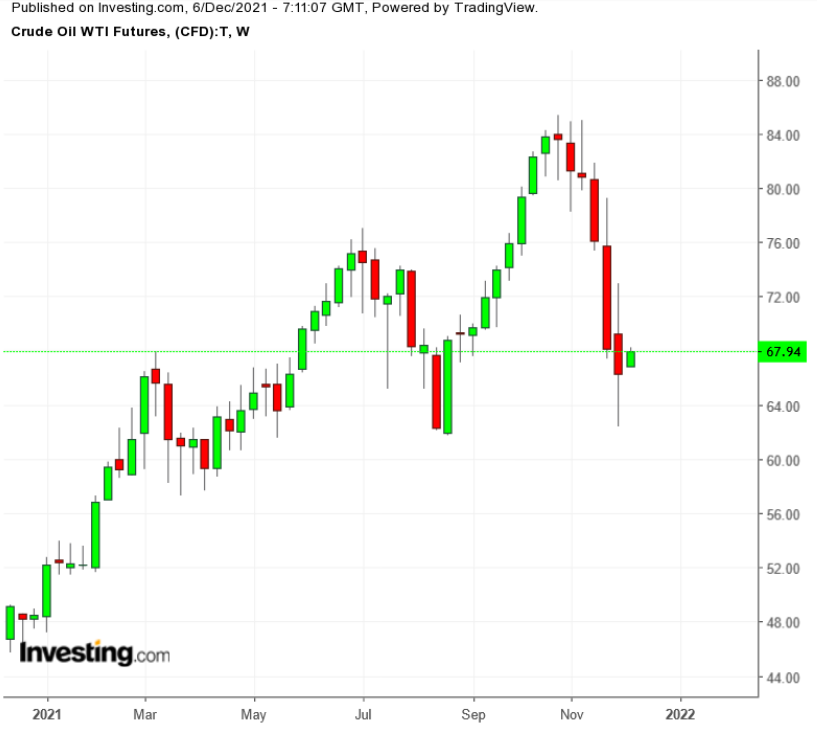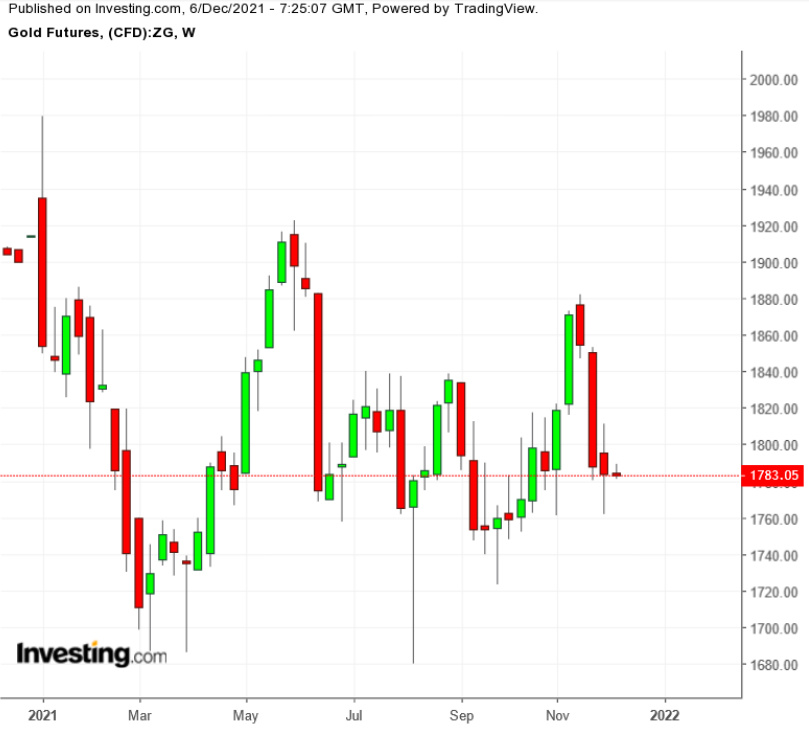Crude prices are likely to swing within the mid $60s-to-$70 a barrel range this week as Saudi Arabia, and other producers in the OPEC+ alliance, try to rescue the market from continued fears over COVID’s Omicron variant that could result in a seventh straight weekly loss.

As trading for the new week began, the Saudis announced that they had raised the so-called OSP, or Official Selling Price, of their crude headed to the United States and Asia in an attempt to show they weren't too bothered about the variant.
The move had the desired effect: Benchmark futures for both US oil and globally-traded Brent jumped 2% on the OSP hike, displaying their most forceful rebound since the first case of Omicron was reported in late November.
Drilling the message home, Amin Nasser, the chief executive of Saudi Aramco (SE:2222), said in a statement that the kingdom’s oil firm was “very optimistic” about demand for energy in the coming quarter and that the market had overreacted to fears about impact of the variant.
Aramco said the Arab Light grade crude for its Asian customers will cost $3.30 a barrel above a benchmark from January, 60 cents more than in December. It also upped by 80 cents the broader pricing on its January-bound crude to Asia and America.
The move came within 48 hours of a thinly-veiled threat by OPEC Secretary General Mohammad Barkindo that oil producers might go back to slashing production if they could not stop the bleed in crude prices that have lost about 20% since hitting seven-year highs above $85 per barrel in mid-October.
"We will continue to do what we know best to ensure we attain stability in the oil market on a sustainable basis," Barkindo told an industry event on Saturday.
Decoded, it meant that the additional 400,000 daily barrels that OPEC and its allies had committed to pump since July will likely be scrapped if global demand and prices for crude remained anemic come January.
OPEC Doublespeak
It was classic doublespeak by OPEC, which just two days earlier, at a meeting late last week with its allies, pledged no change to its production schedule for January—expressing a groundswell of confidence in crude’s supply-demand prospects for the coming quarter, regardless of risks posed by Omicron.
That stance was indeed surprising because an internal OPEC document reported by Reuters ahead of the meeting showed the group had forecast a global oil surplus of 2 million barrels per day in January, 3.4 million in February, and 3.8 million in March.
To be sure, the Saudis and their allies are still withholding some 5.0 million barrels of regular daily supply from the market as part of production cuts carried out at the height of the COVID-19 price crash. They have no qualms adding to that.
“The net effect of all these will be higher volatility going forth and that’s what you’re going to see this week and in the near future—some real yo-yo moves in crude prices,” said John Kilduff, founding partner at Again Capital, an energy hedge fund in New York.
“Omicron cases are on the move and could again dominate both the macro and equity markets. It’ll be hard for the oil constituency alone to ignore that.”
Omicron Cases Piling Up Worldwide, Severity Still Unknown
Since the first US case of Omicron reported on Nov. 30, infections have been detected across at least a third of America’s 50 states. Dozens of countries worldwide also have cases of the variant. While the number of nations reporting Omicron cases continues to rise, scientists are still trying to determine whether the variant’s spread is worse than other forms of COVID and more potent in causing serious illness and death.
In Monday’s Asian trade, London-traded Brent crude, the global benchmark for oil, rose $1.62, or 2.3%, to $71.50 by 1:10 AM in New York (0610 GMT). Brent was down 4% last week, and off 18% for the past six weeks combined, after hitting a 2014 high of $86.70 during the week to mid-October.
West Texas Intermediate, the US crude benchmark, was up $1.68, or 2.5%, at $67.94 per barrel. WTI fell 2.8% last month, and 20% over six weeks combined, from seven-year highs of $85.41 during the week ended Oct. 15.
While WTI’s downside is expected to be capped at $65-$62 this week, it could slide to between $56.90 and $52.90 based on potential tests to the 100-week Simple Moving Average of the US crude benchmark, said Sunil Kumar Dixit, a regular contributor of commodity technicals to Investing.com.
“But since WTI’s primary trend is bullish, corrections of $62-$57 is also a strong confluence area on the monthly chart that will attract value buying, triggering fresh moves up,” Dixit of skcharting.com said, predicting strong overruns of beyond $70 per barrel as well.
Gold Still Seeing Safe-Haven Pops On The New Variant
In gold’s case, Omicron continued to be a “crisis with silver lining” for the yellow metal, propping it steady in the high $1,700s.

Expectations were heavy all of last week for gold to collapse into $1,600 territory after Federal Reserve Chair Jerome Powell said he was ready for the central bank to speed up the taper of its pandemic-era stimulus, and have a US rate hike faster than originally thought. Any US monetary tightening is seen as disastrous for gold.
Despite the Fed’s planned actions, fears about the Omicron’s potential impact on the United States and the world proved bigger in the end, triggering safe-haven buying in gold. That helped the yellow metal’s prices to hover in the high $1,700s and post a meaningful gain at the close of Friday’s futures trade in New York.
In Monday’s Asian trade, US gold futures’ most active contract, February, was up a modest 65 cents, or 0.04%, at $1,784.55 an ounce.
Dixit of skcharting.com said gold needs to advance through $1,810 to retest the most recent peak of $1,825.
But failure to hold above $1,780 may push the yellow metal into a new weakness of $1,750 and $1,735, he cautioned.
Disclaimer: Barani Krishnan uses a range of views outside his own to bring diversity to his analysis of any market. For neutrality, he sometimes presents contrarian views and market variables. He does not hold a position in the commodities and securities he writes about.
